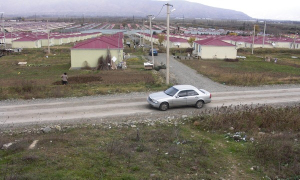While violence continues in Ukraine, Georgia remains divided after similar separatist campaigns.
After violence and ethnic cleansing, South Ossetia (1991/2) and Abkhazia (1992/3) claim independence, are largely without international recognition and are effectively under Russian control. Together they make up 18% of Georgian territory.
These conflicts and a one sided war between Russia and Georgia in 2008 have left up to 10% of Georgians displaced from their homes.
Georgia has become a resolute friend of the West and aspires to join NATO and the EU.
Georgia joined the war in Afghanistan where it became the largest contingent relative to its population, and Iraq where it became the third largest contributor of personnel in absolute terms. There were no domestic protests against Georgia’s involvement in either conflict.
An oil pipeline passes through Georgia carrying oil to Europe and its strategic location in the Caucasus makes Georgia an important ally.
But unemployment is high and the economy weak. Georgians view the conflict in Ukraine with concern and hope for support from their Western allies. There are also concerns that Georgian society, though relatively stable, might be vulnerable to manipulation by outside forces, particularly Russia.
The blueprint for the setting up of ethnically based enclaves on former Soviet territory was the conflict in the Nogorno-Karabakh region of Azerbaijan from 1988. The Armenian majority of the region established a de-facto state with support from Russia and Iran as well as Armenia itself.
Armenia and Azerbaijan are still technically at war, and Georgia has minorities of both peoples. Not surprisingly, after the brutality of the Nogorno-Karabakh conflict, they dislike each other. About 45% of the people of the Kvemo Kartli region of Georgia are Azeris, while in the Samtskhe-Javakheti region, a majority are Armenian.
Infrastructure links through the mountains to the Samtskhe-Javakheti area have been poor and the Armenian minority have tended to identify more with Yerevan than Tbilisi. Most do not speak Georgian and rely on Russian and (pro Russian) Armenian TV and radio. Their inability to speak Georgian has also led to the Armenian community being under represented in the political system and public services.
Attempts are now being made to improve communications with the capital and to encourage Armenian farmers to trade their goods in Tbilisi rather than Yerevan, with NGO’s being particularly active. It is hoped that this will result in more Armenians learning to speak Georgian and less resentment towards Georgia.
Armenia borders Azerbaijan (with which it is officially still at war), Turkey (with whom it has no diplomatic relations, a result of the genocide against it during World War 1), Iran (with whom it has close relations) and Georgia. Georgia provides an overland route for trade with Russia, Armenia’s closest ally, meaning that Armenia has no stomach for stirring up or supporting a separatist revolt in Georgia. Russia has implemented punitive sanctions against Georgia from time to time, but there is a feeling that it has been restrained in this by not wanting to harm Armenian trade via Georgia.
This means that there is little likelihood of conflict erupting in the Samtskhe-Javakheti region in the near future, which will allow Georgia time to embrace its Armenian minority.
Although the Armenian areas do not have any special status, the Adjara area on the Black Sea coast bordering Turkey does. The population there is Georgian, speaking a local dialect of the language, their autonomy having been established in Soviet times. Almost half are Muslim.
There has been some conflict between Adjara and Tbilisi, the most recent being protests in 2004, when a more serious confrontation was avoided. In common with other divisions, the status of the area arose from Soviet administrative arrangements. Other Georgian sub groups exist, but without the same status..
Although almost 85% of the population of Georgia are Georgians, and take great pride in the history and heritage of their country, there are sub groups within the population. Georgia is a mountainous country and much of the country remote. Transportation between the regions has historically been difficult.
As in many other former communist countries, people tend to remain in the area of their birth or migrate to the capital, it being rare for people to relocate between provincial areas.
Many who live in Tbilisi maintain close links with their village of origin and will if possible maintain houses there. Holidays tend to be spent in the family village, so many Georgians have not travelled widely within their own country, despite its many tourist attractions.
This has resulted in local dialects and sub cultures remaining. In many cases the origin of Georgians can be determined by their facial features. There are many divisions that could be exploited by a powerful neighbour like Russia which feels threatened by Georgian ambitions to join NATO and the EU, especially given the weakness of the Georgian economy.
Once a powerhouse of the Soviet economy, Georgia is now in a state of financial crisis. The United National Movement, swept from power in 2010, is making a concerted bid for power in next years elections (which could be brought forward) through a strategy of protests against the ruling Georgian Dream coalition, which could have a destabilising effect.
Russia may also see an opportunity here. Already well funded groups are advocating Georgian membership of the Eurasian Union, a Russian led counter to the EU. Many Orthodox church leaders are advocating closer ties with Orthodox Russia, including some who advocate the sort of homophobic stance of Putin. There will be pro Russia candidates in the next election, and it seems certain that some will be elected.
Ironically Western measures against Russia have been a major cause of a financial crisis in Georgia.
Clearly assisting the Georgian economy offers good value to the West if the alternative could be Georgia slipping into the Russian sphere of influence. Another positive move would be the easing of visa restrictions by European countries. Currently the Schengen countries undertake to process visa applications within 10 working days. However this is triggered by an interview and the current waiting time for that is four weeks, so the agreement does little to create goodwill. Visa free entry to the Schengen countries is under discussion.
I would expect Georgia to remain a good friend of the West. But to maintain that friendship it may need a little help from its friends.

